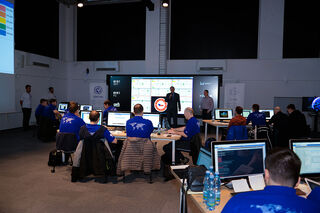Degree programme specification
Do you feel an opportunity in the fast-growing job market of cybersecurity experts?
Do you enjoy looking at computer systems "under the skin", learning as much as possible about their nature, properties and behavior? Do you want to know the motivations of cyber-attackers and orient yourself in the legal environment of IT?
Do you want to study at a prestigious school featuring its own Cyber Range and cooperating with top companies and leading institutions of the local, national and international level? Then a professional bachelor's program in Cybersecurity is the right choice.
This unique multidisciplinary three-year professional Bachelor's study includes a guided professional internship and prepares students to get a job right immediately after graduation while those interested can continue in the follow-up Master's study.
Study plans
Studies
- ObjectivesOn a European scale, there is evidence of interest in hundreds of thousands of cyber security professionals (generally up to 800,000 vacancies in IT in general, of which up to 2022 according to the EC Communication: Resistance, Deterrence and Defense… 450/2017 up to 350,000 vacancies in cybersecurity). Multidisciplinary professional education is explicitly needed by Czech authorities (NÚKIB) and industrial and commerce associations.
The demand for professions fulfilling the specific requirements of the Directive on a high level of cybersecurity throughout the Union (NIS2) with a focus on critical infrastructure, i.e. for roles of cybersecurity managers (according to the NCIS, there will be 6,000 mandatory organisations, of which 600 are critical), has increased. There are or will be sectoral regulations in specific sectors (healthcare, energy), such as the Network Code on Cybersecurity in the energy sector. Graduates may be involved in technical management and operational roles in relation to the proposed Regulation on Electronic Identification and Trust Services for Electronic Transactions in the Internal Market (eIDAS), or similarly for professions related to the proposed Cyber Resilience Act (CRA), which adds cybersecurity to the criteria for obtaining the (CE) mark, or in the future for professions related to the proposed Artificial Intelligence Act.
The program will meet the growing interest of both high school graduates and already employed jobseekers without formal education in the field who carry out professions where knowledge and skills in cybersecurity (system administrators, supervisory center operators, CSIRT team members, middle management of cyber security, eventually software engineers of security-relevant IT applications and systems, but also cyber security training staff, cyber security managers assistants).
- Learning Outcomes
After successfully completing his/her studies the graduate is able to:
- immediately get a job and continually adapt to changing processes and technologies
- work in positions related to the deployment and operation of secure IT systems and infrastructures in companies and organizations of various sectors such as IT, public administration, services, industry, healthcare
- recognize, understand and recognize opportunities and risks of intelligent systems, as well as cybersecurity risks globally and in an organization
- understand the basic elements of computer systems, both hardware and software, with focus to their reliable operation and cybersecurity incl. their vulnerabilities and manages to install, set up, manage and operate these systems
- explain and use fundamental techniques and technologies to ensure cybersecurity of entrusted IT systems and infrastructures
- understands ethical and legal principles of working with data, including commercially confidential, classified and personal data, and can apply them in specific procedures
- describe the basic parameters of the legal environment in the cyberspace, identify legislative requirements for the organization's activities and for the relevant professional roles
- explain and apply the basic principles of analysis, design, implementation and quality control of computer systems
- Occupational Profiles of Graduates
Graduates can get a job as system or network administrator, operators of Security Operations Centers, members of CSIRTs, lower or middle management of cybersecurity, or software engineers of secure IT applications and systems, but also as training workers or assistants to cybersecurity managers.
There is evidence of interest in up to hundreds of thousands of workers
capable of performing cyber security professions in Europe. Demand has
increased dramatically following the adoption of the European NIS2
Directive on a high level of cybersecurity in the Union with a focus on
critical infrastructure. The forthcoming Network Code on Cybersecurity
will work similarly. Further demand for security experts can be expected
around the regulation of artificial intelligence in the EU.
- Practical TrainingIn the Cybersecurity study programme, students complete a compulsory internship of 12 weeks/480 hours within one semester. The internship is designed to familiarize students with the aspects of operating secure systems and to learn how to work in multidisciplinary teams. Information on internships can be found in the Course Catalogue, in the study materials of the course or on website.
- Goals of ThesesIn Bachelor thesis, the student is expected to demonstrate the ability to master selected security-relevant technology, secure a computer system, implement cybersecurity recommendations, deploy and configure a larger system, develop basic security analysis, describe risks in the organization and apply it in a particular organization.
- Access to Further StudiesThose interested can continue in the follow-up Master's study program Management of Software Systems, Services and Cybersecurity at the Faculty of Informatics or other programs.
